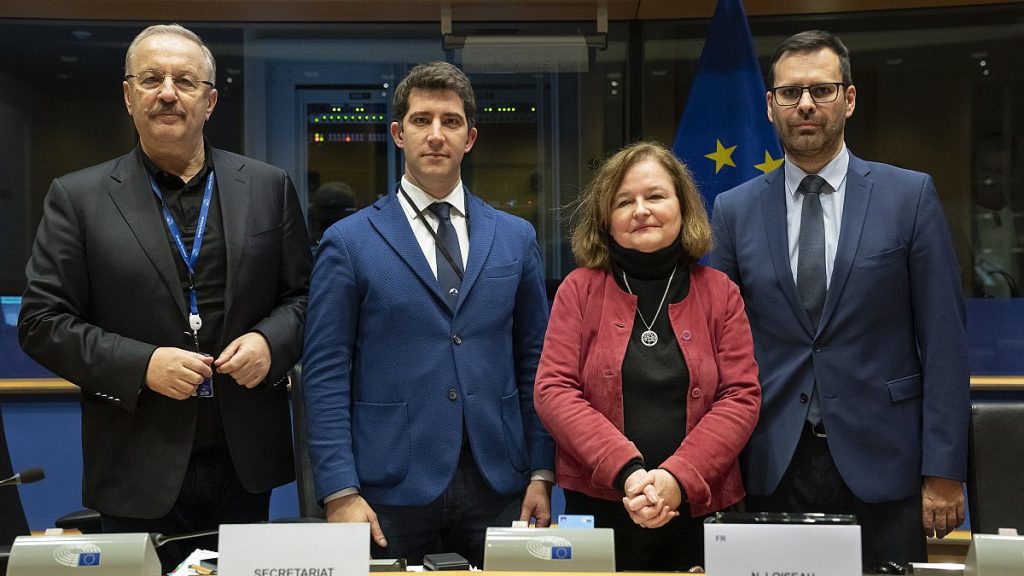The establishment of the European Democracy Shield (EUDS), a special committee within the European Parliament designed to safeguard democratic processes, has been mired in controversy from its inception. The inaugural meeting witnessed the election of Nathalie Loiseau, a liberal MEP from France, as chair, alongside vice-chairs representing the two dominant political blocs: the Socialists & Democrats (S&D) and the European People’s Party (EPP). This seemingly routine process ignited a firestorm of criticism from far-right and independent lawmakers, who decried the appointments as a product of backroom dealings and a betrayal of democratic principles.
The crux of the discontent stems from the European Parliament’s unofficial “cordon sanitaire,” a strategy employed by mainstream pro-European parties to exclude far-right factions from leadership positions within committees. This tactic, implemented following the formation of the new Parliament, effectively shut out groups like Patriots for Europe, the third-largest force in the chamber, from holding any chair or vice-chair roles. The allocation of these positions among the larger parties left smaller groups powerless to challenge the outcome, sparking accusations of undemocratic practices.
The Patriots for Europe delegation vehemently protested the process, arguing that their size and influence within the Parliament warranted a greater voice in the appointments. Marieke Ehlers, a Dutch MEP representing the Patriots, highlighted the established convention of granting speaking rights based on group size, a principle seemingly disregarded in the EUDS appointments. António Tânger Corrêa, the Patriots’ candidate for the chair position, condemned the election as a “farce” and an “insult to democracy,” emphasizing his extensive experience in public service and his commitment to democratic values. He asserted that his exclusion was driven purely by political motivations rather than a lack of qualifications.
The accusations of undemocratic practices were met with sharp rebuttals from members of the established political blocs. Kathleen Van Brempt, a Belgian MEP from the S&D group, retorted that democratic processes necessitate a majority, implying that the Patriots’ lack of support precluded their claim to leadership positions. Loiseau, the newly elected chair, alluded to concerns about the erosion of the rule of law in EU member states governed by parties aligned with the Patriots for Europe, suggesting that their exclusion was a protective measure. She expressed hope for collaborative work within the committee, emphasizing impartiality and the need to earn the trust of European citizens.
The controversy extended beyond the EUDS committee, spilling over into the formation of the special committee on housing. The Patriots again found themselves marginalized, prompting accusations of a systematic effort by the left to block their access to leadership roles. This pattern of exclusion fueled the perception of a concerted effort to silence dissenting voices within the Parliament. The Hungarian MEP György Hölvényi articulated this sentiment, highlighting the moral responsibility borne by those who perpetuate the cordon sanitaire.
The exclusionary practices also drew criticism from independent lawmakers. Fidías Panayiótou, a Cypriot MEP and YouTuber, openly challenged the established political system in his bid for the first vice-chair position of the EUDS committee. He argued that merit should be the sole criterion for such appointments, condemning the prevalence of backroom deals that predetermine the outcome of elections. Despite his defeat, Fidías viewed his candidacy as a means to expose the flaws within the Parliament’s democratic processes. Loiseau, in response, simply stated that winning and losing are inherent aspects of democracy.
The dispute surrounding the EUDS committee appointments underscores a deeper tension within the European Parliament between the established political order and emerging voices challenging the status quo. The cordon sanitaire, while arguably a defensive measure against extremist ideologies, risks undermining the very democratic principles it purports to protect. The exclusion of dissenting voices, regardless of their political leanings, creates an echo chamber that can stifle debate and erode public trust in the institution. The EUDS, tasked with protecting democracy, ironically finds itself embroiled in a controversy that raises fundamental questions about the practice of democracy within the Parliament itself.

